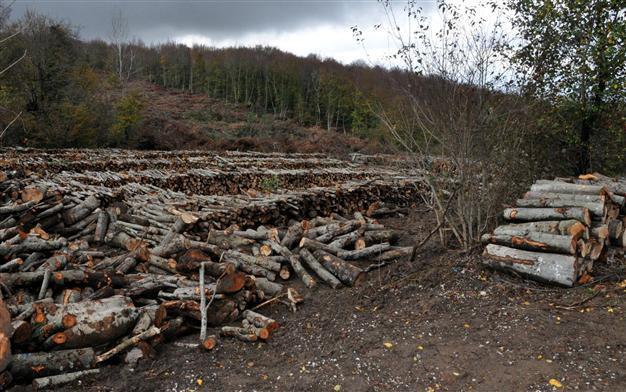43,000 trees set to be felled near Black Sea port for new coal plant
BARTIN – Doğan News Agency

Around 43,000 trees will be cut down in an area close to the port town of Amasra, in order to build the power distribution lines that will transmit electricity generated by a new coal plant. DHA Photo
Turkey is bracing for more government-backed pillaging of the natural environment for fossil fuels and cement, with a new coal plant project in the western Black Sea province of Bartın expected to lead to the destruction of a huge 183,000-hectare forested area.
According to official documents provided by Turkey’s Electricity Transmission Corporation, some 43,000 trees will be cut down in an area close to the port town of Amasra, in order to build both the facility and the power distribution lines that will transmit electricity generated by the coal plant.
Locals have expressed outraged that the authorities have already started felling trees on a 36.5-kilometer line, although the legal process that will eventually allow the construction of the plant has yet to be concluded.
The plant has drawn huge reactions from locals and environmental activists alike, who said it would cause irreparable damage to the environment for Amasra, a picturesque coastal town that is aiming to enter UNESCO’s permanent cultural heritage list.
The process of the bid offer, the choice of land, and the legal battle against the environmental impact assessment report (ÇED) - which was approved despite experts’ warnings about the plant’s possible damage - had already triggered vast controversy and sparked local resistance. More than 40,000 signatures have been collected against the plant, while fishermen have also joined the fight, arguing that the pollution would likely effect their activity, which is a pillar of the local economy.
“The environmental impact assessment report has still not been finalized thanks to the huge popular reaction. It has been canceled five or six times. In other words, thousands of trees are being cut for a plant whose permit has not yet been issued,” said Erdoğan Atmış, a professor at the Forestry Faculty of Bartın University.
Atmış said the company that cut down 6,000 olive trees in the Aegean coal mine capital of Soma had the license to build the plant, although the legal battle regarding the expropriation decision for the olive plantation was ongoing at the time. However, in Amasra, the final permission to the constructor company set to build the plant, Hattat Holding, has still yet to be granted.
Two previous environment assessment reports for the 1,320-megawatt plant were rejected in 2010 and 2011. The company conducting the project, Hattat Holding, changed the location to the village of Gömü in 2013. The mainly positive report was eventually accepted after the company’s third attempt, but activists have once again taken it to the court.
Manipulation of general interest provisionAtmış said the authorities had used a provision of the Forestry Law that allowed them to build facilities, such as power distribution lines, in forests in the name of “general interest.”
“But we are objecting to this. They can pass this line through another area, but you can’t bring back the forest. You will end up damaging the forest, the wildlife there and the social life as a whole,” he said.
Villagers in the area have said that the felling of trees started two months ago. “If we went to cut trees in the forest, they would prosecute us. But some very big trees have already been cut down. Every day they are loading several trucks with trees that they fell … This is literally a massacre,” said Ali Özkanca, who lives in the nearby village of Saraylı.
Forests in the area are known for their rich vegetation of trees and their preserved natural life.
Environment Minister İdris Güllüce has defended the project, expressing regret for the “unbearable dilemmas” that humans face when a choice has to be made in life.
“This is the grave dilemma of this age: Everybody wants everything. You want electricity, you want to use a phone, but at the same time you don’t want the presence of an energy station,” Güllüce said.
Officials have generally stressed the necessity to increase Turkey’s energy production to cope with the country’s rapidly rising demand.
The local activists’ battle in Amasra is waged against only one of dozens of energy facility projects across the country, with the government pushing for the speedy construction of new energy production sites regardless of ecological damage.
In particular, the construction of hundreds of hydroelectric plants has damaged many preserved natural areas, damaging the local economy.
